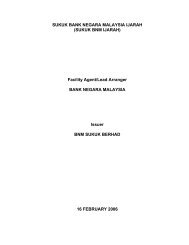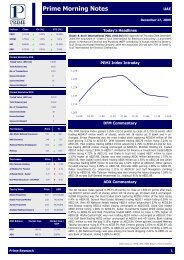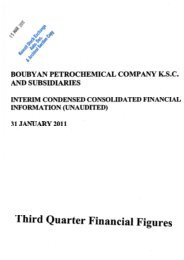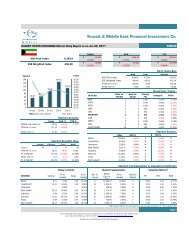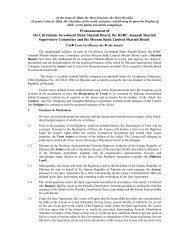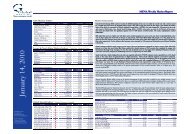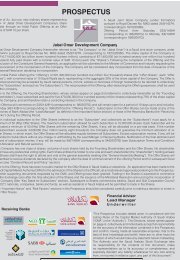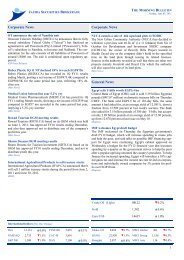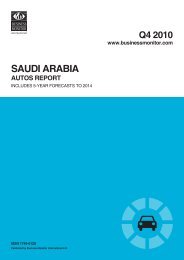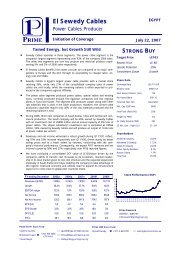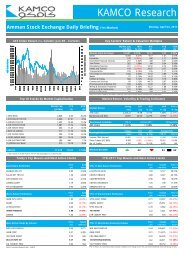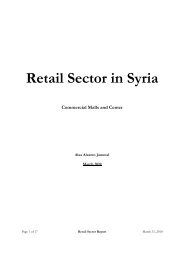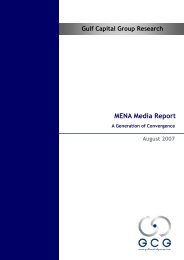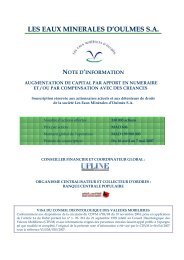You also want an ePaper? Increase the reach of your titles
YUMPU automatically turns print PDFs into web optimized ePapers that Google loves.
12 Libya<br />
Spending constraints lead to<br />
larger budget surplus<br />
NOC claims large rise<br />
in reserves<br />
another". South Korean companies have heavily invested in Libya and have<br />
carried out a huge amount of construction work for a number of years. It is<br />
therefore important for them to establish Libya's probable policy direction and<br />
who is likely to succeed Colonel Qadhafi.<br />
Economic policy<br />
The government has released provisional budget data for 2009, which show<br />
that expenditure was lower than expected. Administrative expenditure fell by<br />
10% from 2008 to LD14bn (US$11bn), and development expenditure fell by 39%<br />
to LD18bn. However, a new category of "other expenditure" was included,<br />
which totalled LD8.9bn. Assuming previously announced government capital<br />
expenditure plans are correct, this should be included as part of capital<br />
expenditure, which, in this case would total LD27bn.<br />
Meanwhile, revenue was broadly in line with expectations. Oil revenue fell by<br />
45% from 2008 to LD35bn, which was 80% of total revenue, down from 88% in<br />
2008. These developments were a consequence of lower average oil prices.<br />
Non-oil revenue increased by 7.9% to LD9bn as a result of a higher tax take. The<br />
increase was primarily due to an increase of LD651m (US$509m) in customs tax<br />
revenue. Although the government has tended to cut tariffs in recent years, an<br />
increase in services import tax from 4% to 10% and also increases in<br />
consumption taxes on imported products in 2009 are probably responsible for<br />
this. In total, the budget was LD4bn, or 4.6% of GDP, in surplus, considerably<br />
lower than the LD28bn (24% of GDP) in 2008 as a result of lower oil revenue.<br />
80,000<br />
70,000<br />
60,000<br />
50,000<br />
40,000<br />
30,000<br />
20,000<br />
10,000<br />
0<br />
Public finances<br />
(LD m)<br />
Budget revenue<br />
2005<br />
06<br />
Budget expenditure<br />
Sources: Central Bank of Libya; Economist Intelligence Unit forecasts.<br />
Budget balance<br />
<strong>Country</strong> <strong>Report</strong> August 2010 www.eiu.com © The Economist Intelligence Unit Limited 2010<br />
07<br />
According to the head of the NOC, Mr Ghanem, oil companies met with<br />
considerable success during 2009 and the first half of 2010 in their<br />
hydrocarbons exploration efforts. Mr Ghanem claimed in early August that of<br />
the 65 new wells drilled last year, the NOC, in concert with international oil<br />
companies (IOCs), found recoverable reserves of either oil or gas in 51% of<br />
them. As a result, the country's oil reserves rose by 653m barrels, which was<br />
more than total production in 2009 of around 566m barrels. Mr Ghanem also<br />
claimed that gas reserves had increased by 782bn cu ft. Libya's exploration<br />
programme has seemingly had even greater success over the first six months of<br />
08<br />
09<br />
10<br />
11



